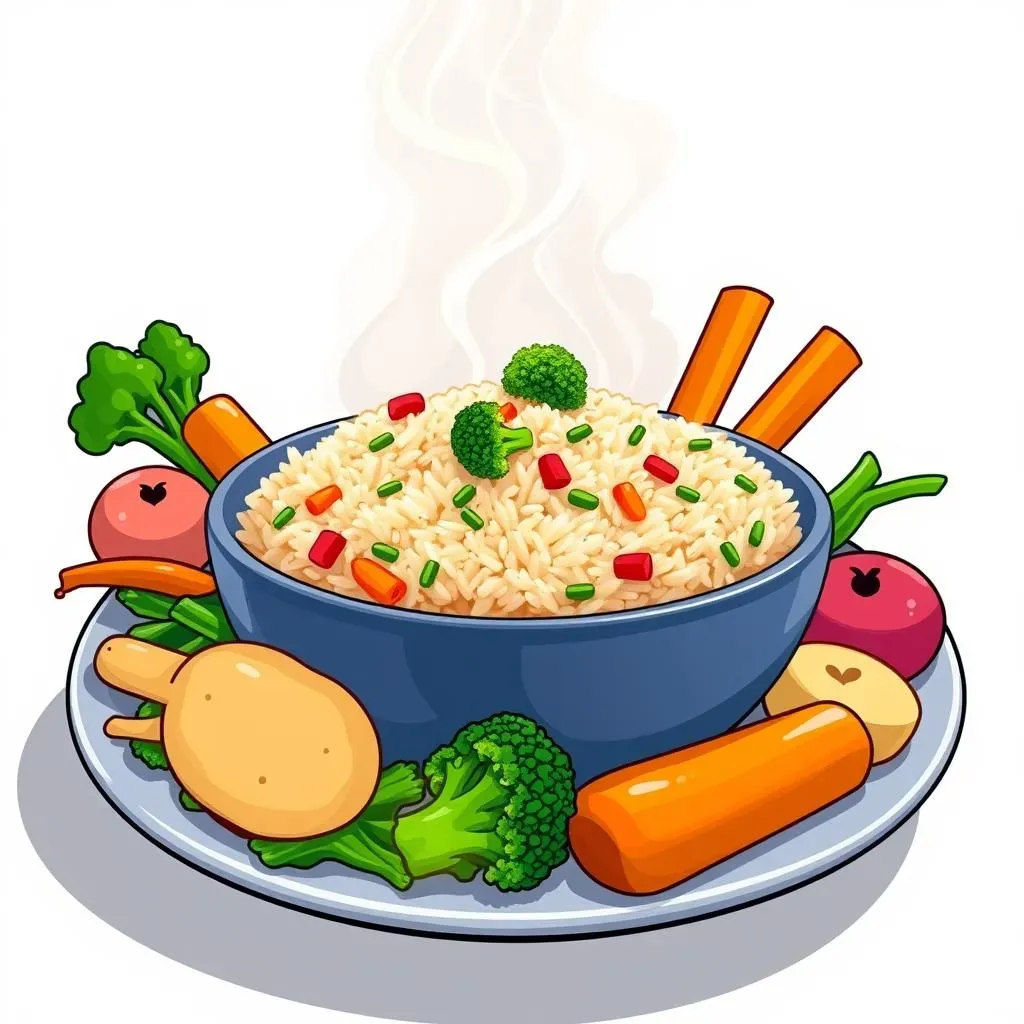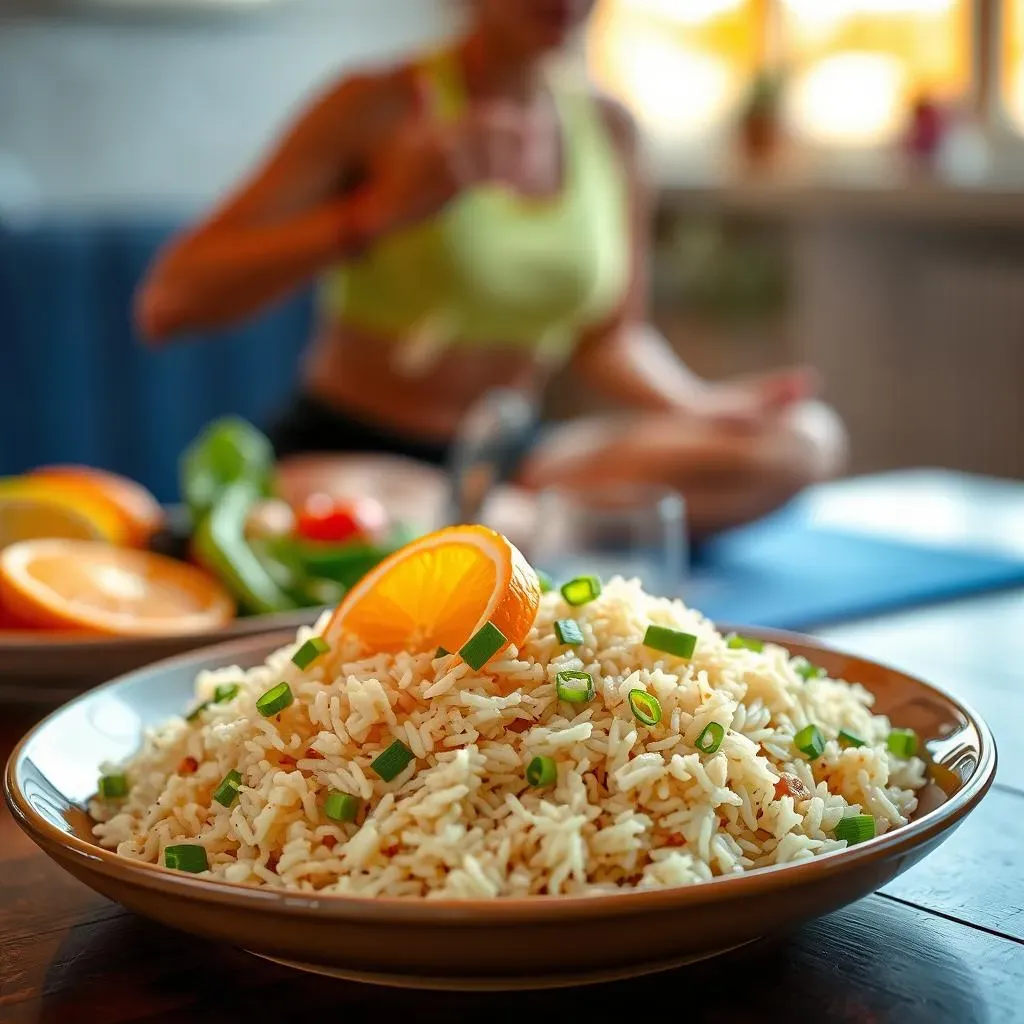Table of Contents
We've all enjoyed a delicious plate of fried rice, but have you ever considered its potential to boost your health? This article explores the fascinating connection between a seemingly simple dish and your immune system. Forget the late-night takeout guilt; we'll uncover the truth behind the "immune system benefits of fried rice." We'll examine the key nutrients packed into this global favorite, exploring how vitamins, minerals, and specific ingredients contribute to a strong defense system. Get ready to discover which ingredients are your immunity allies and which might need a second look. We'll also discuss how to make fried rice a truly healthy choice, balancing deliciousness with nutritional wisdom. Prepare to be surprised by the science-backed potential of this everyday meal, and learn how to incorporate this knowledge into your diet for a healthier, more resilient you. Let's dive in and uncover the secrets to unlocking the immune-boosting power of fried rice!
Immune System Benefits of Fried Rice: Fact or Fiction?

Immune System Benefits of Fried Rice: Fact or Fiction?
Separating Fact from Fiction
So, you're diving into the world of fried rice and immunity? That's awesome! Let's be clear: Fried rice itself isn't a magic bullet for a supercharged immune system. Think of it more like a toolbox filled with potential goodies. The real story lies in the *ingredients*. A plate loaded with veggies, lean protein, and minimal oil is vastly different from one swimming in sodium and saturated fat. The key is mindful preparation.
Many articles claim miraculous immune boosts from fried rice. While some ingredients *do* contribute to immune health, it's crucial to avoid overhyped claims. We're not talking about curing diseases here. Instead, we're exploring how smart ingredient choices can support your body's natural defenses. A balanced diet, including various fruits, vegetables, and whole grains, is always the best approach.
Ingredient | Immune-Boosting Properties | Caution |
|---|---|---|
Broccoli | Rich in Vitamin C and antioxidants | Overcooking can reduce nutrient levels |
Carrots | Good source of Vitamin A, supporting healthy mucous membranes | High glycemic index if eaten in large quantities |
Ginger | Anti-inflammatory properties | Can interact with certain medications |
The Role of Ingredients
Let's talk about the players in this immune-boosting game. Think of vegetables like colorful superheroes: broccoli, carrots, peppers – they're packed with vitamins C and A, antioxidants, and other vital nutrients. These are your body's line of defense against invaders. Lean proteins, like chicken or tofu, provide the building blocks for immune cells. Even the right type of oil can help – think monounsaturated fats from olive oil or avocado oil instead of saturated fats.
But beware the villains! Excessive sodium, unhealthy fats, and over-processed ingredients can sabotage your immune system. Think of it as this: a fried rice dish packed with sodium, saturated fat and refined carbs is like sending your immune system into battle wearing lead boots. It's going to be a tough fight. So, focus on whole, unprocessed ingredients and moderate portions. Remember, moderation is key!
- Choose brown rice over white rice for added fiber.
- Load up on colorful vegetables.
- Opt for lean protein sources.
- Use healthy cooking oils sparingly.
The Nutritional Powerhouse: Vitamins and Minerals in Fried Rice

The Nutritional Powerhouse: Vitamins and Minerals in Fried Rice
Vitamin Power-Up: A Colorful Boost
Okay, so we've established that fried rice isn't inherently magical. But let's talk about the real stars of the show: the ingredients! Think vibrant vegetables – they're not just pretty, they're nutritional powerhouses. Broccoli is bursting with Vitamin C, a crucial player in immune function. Carrots contribute Vitamin A, essential for maintaining healthy skin and mucous membranes – your body's first line of defense. And don't forget the peppers! They're packed with Vitamin C too, along with other antioxidants.
The beauty of fried rice lies in its versatility. You can easily customize it to maximize its nutritional benefits. Think about adding other immune-boosting superstars like spinach, mushrooms, or even a sprinkle of turmeric for its anti-inflammatory properties. Remember, the more colorful your veggies, the more diverse the nutrient profile, leading to a stronger immune response. The key is to think beyond just the "fried rice" label and focus on the nutritional potential within.
Vegetable | Key Vitamins & Minerals | Immune Benefits |
|---|---|---|
Broccoli | Vitamin C, Vitamin K, Fiber | Supports antioxidant defenses, strengthens immune cells |
Carrots | Vitamin A (beta-carotene), Potassium | Maintains healthy mucous membranes, supports cell growth |
Bell Peppers | Vitamin C, Vitamin A, Antioxidants | Boosts antioxidant defenses, fights inflammation |
Mineral Marvels: The Unsung Heroes
Beyond vitamins, minerals play a crucial, often overlooked, role in immune function. Many vegetables commonly found in fried rice, such as leafy greens and carrots, are excellent sources of minerals like potassium and magnesium. These are essential for maintaining fluid balance, nerve function, and muscle contraction – all vital for a healthy immune response. Even the protein source you choose adds to the mineral mix. For example, chicken or tofu provide zinc, another key player in immune cell development and function.
Let's not forget the power of spices! Ginger, often used in fried rice, has well-documented anti-inflammatory properties, which can help regulate the immune system and reduce inflammation. Garlic, another common ingredient, also boasts antimicrobial and antioxidant properties, adding another layer of immune support. So, while the "fried" aspect might seem less than ideal, the potential for nutritional goodness within a well-crafted fried rice dish is huge. It's all about making smart ingredient choices.
- Potassium: Regulates fluid balance, supports nerve function
- Magnesium: Crucial for muscle and nerve function, reduces inflammation
- Zinc: Essential for immune cell development and function
The Rice Factor: Beyond Empty Calories
While white rice often gets a bad rap, it's not the nutritional villain many make it out to be. It does provide carbohydrates, which are the body's primary source of energy – essential for immune cell activity. However, opting for brown rice significantly boosts the nutritional value. Brown rice is higher in fiber, which aids digestion and supports a healthy gut microbiome – a crucial aspect of overall immune health. The fiber in brown rice also contributes to feelings of fullness, potentially aiding in weight management, which can indirectly support immune function.
Choosing the right type of rice is a simple yet impactful way to elevate the nutritional profile of your fried rice. Incorporating a variety of vegetables, lean proteins, and healthy fats creates a truly well-rounded meal that supports a variety of bodily functions, including your immune system. Remember, it’s not just about what you eat, but how you prepare it. Using healthy cooking methods such as stir-frying with minimal oil can help retain more nutrients, ensuring you're getting the most from each ingredient. So, next time you’re craving fried rice, remember the power of mindful ingredient choices!
Boosting Immunity: How Fried Rice Ingredients Support Your Defense System

Boosting Immunity: How Fried Rice Ingredients Support Your Defense System
Boosting Immunity: A Deeper Dive into the Mechanisms
Let's move beyond simply listing vitamins and minerals and explore *how* these nutrients actually bolster your immune system. It's not just about having the ingredients; it's about understanding their roles in your body's defense mechanisms. Vitamin C, abundant in broccoli and peppers, is a powerhouse antioxidant, neutralizing harmful free radicals that can damage cells and weaken your immune response. It also plays a critical role in collagen production, essential for wound healing and tissue repair. Vitamin A, found in carrots, supports the integrity of your mucous membranes – the first line of defense against invading pathogens. A healthy gut microbiome, fostered by the fiber in brown rice, is also key, as a significant portion of your immune system resides in your gut. A healthy gut helps maintain a balanced immune response.
The anti-inflammatory properties of ginger and garlic are also key players in immune modulation. Chronic inflammation can suppress immune function, making you more susceptible to illness. By reducing inflammation, these spices can help your immune system operate at peak efficiency. The lean protein you choose – chicken, tofu, or even shrimp – provides the building blocks for immune cells, ensuring your body has the resources it needs to fight off infection. It’s a synergistic effect; each ingredient contributes to a stronger, more resilient immune response. It's not just about adding ingredients, but also about understanding the combined effects of all the ingredients working together.
Nutrient | Mechanism of Action | Immune Benefit |
|---|---|---|
Vitamin C | Antioxidant, collagen synthesis | Enhanced immune cell function, faster wound healing |
Vitamin A | Mucous membrane maintenance | Improved barrier function against pathogens |
Fiber | Gut microbiome support | Balanced immune response, reduced inflammation |
Ginger/Garlic | Anti-inflammatory action | Reduced inflammation, optimized immune function |
The Synergy of Ingredients: More Than the Sum of Its Parts
It's crucial to emphasize that the immune-boosting effects of fried rice are not simply additive. The interplay between different nutrients creates a synergistic effect, meaning the combined impact is greater than the sum of individual contributions. For instance, Vitamin C works more effectively in the presence of sufficient Vitamin A. Similarly, the anti-inflammatory properties of ginger and garlic enhance the absorption and utilization of other nutrients. This combined effect is what makes a well-crafted fried rice dish a powerful tool for supporting immune health. It’s a holistic approach, not just about individual nutrients.
Think of it like a well-oiled machine: each part plays a vital role, but the machine only functions optimally when all parts work together in harmony. The same principle applies to your immune system. A balanced diet rich in diverse nutrients, including those found in thoughtfully prepared fried rice, ensures all systems are functioning at their best, creating a robust and resilient defense against illness. Remember, it’s not just about the individual ingredients but how they work together to strengthen your immune system.
- Vitamin C enhances iron absorption
- Zinc improves Vitamin A utilization
- Fiber promotes gut health, impacting overall immunity
Immune System Benefits of Fried Rice: A Balanced Approach

Immune System Benefits of Fried Rice: A Balanced Approach
Moderation and mindful eating: The key to unlocking the benefits
Let's be real: even the healthiest foods can be detrimental if consumed in excess. Fried rice, with its potential for high sodium, unhealthy fats, and refined carbs, is no exception. While we've highlighted the immune-boosting potential of its ingredients, overindulging can negate those benefits. Think of it like this: a small, well-balanced serving of nutrient-rich fried rice can contribute positively to your immune health, but a mountain of it, laden with unhealthy additions, will likely have the opposite effect. Remember, portion control is crucial. Prioritize a balanced plate, incorporating fried rice as one element within a wider, healthy dietary plan.
Think about the overall context of your diet. Fried rice shouldn't be your daily staple, but rather a delicious and occasional addition to a balanced meal plan. Consider it a treat, not a dietary foundation. Pair it with plenty of fruits, vegetables, and whole grains to ensure you're getting a broad spectrum of nutrients. This holistic approach is far more effective than relying on any single food to magically boost your immune system. Remember, a diverse and balanced diet is always the best strategy for optimal health.
- Aim for moderation: Fried rice should be an occasional treat, not a daily meal.
- Prioritize balance: Combine fried rice with other healthy foods in your diet.
- Focus on whole foods: A diet rich in fruits, vegetables, and whole grains is key.
Beyond the Dish: Lifestyle Factors for a Robust Immune System
While the nutritional content of fried rice can contribute to immune health, it's essential to remember that a strong immune system depends on a multitude of factors beyond just diet. Lifestyle choices play a significant role. Sufficient sleep, regular exercise, stress management, and adequate hydration are all crucial for optimal immune function. No amount of perfectly prepared fried rice will compensate for a consistently poor lifestyle. Think of your immune system as a complex ecosystem; various factors contribute to its overall strength and resilience. A balanced approach that considers all aspects of your well-being is essential for a truly robust and healthy immune system.
Consider this analogy: your immune system is like a garden. Nutrients from healthy foods like well-prepared fried rice provide the rich soil and fertilizer. However, neglecting other aspects of garden care—like watering (hydration), sunlight (sleep), and weeding (stress management)—will prevent it from flourishing. Similarly, neglecting other aspects of your well-being will hinder your immune system’s ability to function optimally. Therefore, embrace a holistic approach. A balanced diet, coupled with a healthy lifestyle, creates the ideal environment for a strong and resilient immune system. It’s the synergy between diet and lifestyle that truly unlocks the potential for optimal health.
Lifestyle Factor | Impact on Immune System |
|---|---|
Sufficient Sleep | Allows immune cells to regenerate and function optimally |
Regular Exercise | Reduces stress, improves circulation, boosts immune cell activity |
Stress Management | Reduces cortisol levels, preventing immune suppression |
Hydration | Supports immune cell function and transportation of nutrients |